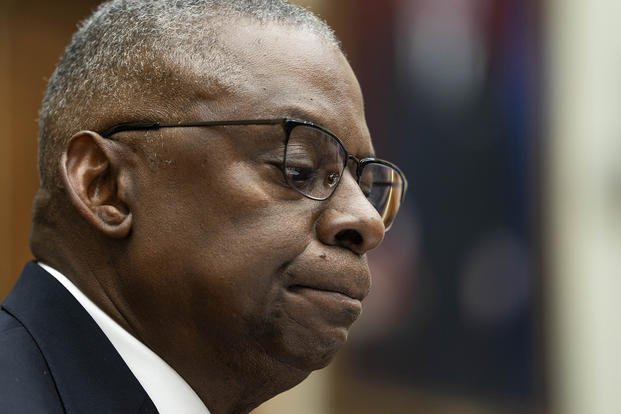Republicans tore into Defense Secretary Lloyd Austin on Thursday over his failure to notify the White House for days about his hospitalization for complications from prostate cancer surgery.
At his first appearance before Congress since the hospitalization, Austin repeatedly stressed that there were never any gaps in command and control of the military during his emergency hospitalization and that procedures for notifying other Pentagon officials and the White House of absences have since been improved.
But he dodged several questions about holding himself or his staff accountable for failing to notify the president he was in the hospital, and at one point acknowledged he does not know who made the decision not to inform the public, despite the Pentagon completing an internal review into what went wrong.
Read Next: The Army Is Going All-In on Food Kiosks as Base Dining Facilities Struggle
The testimony infuriated Republicans on the House Armed Services Committee, who blasted the secrecy surrounding the early January hospitalization as "totally unacceptable," an "embarrassment" and "an extreme lack of leadership."
"Our adversaries should fear us," Rep. Jim Banks, R-Ind., said. "And what you've done is embarrass us."
That Austin could be in the hospital for three days without the president knowing, Banks added, suggests "the president is that aloof or you are irrelevant."
While some Democrats on the committee said the breakdown in communications was troubling, they also downplayed any national security concerns and repeatedly pivoted to the perils of Congress not approving funding for Ukraine and the Defense Department. The Pentagon, like the rest of the federal government, is operating on a stopgap funding measure more than five months into the fiscal year, and a bill to provide aid for the wars in Ukraine and Israel has stalled in the House.
"There was nothing embarrassing about what happened here. There was nothing that makes us appear weak," Rep. Adam Smith, D-Wash., the ranking member of the committee, said about Austin's hospitalization. "If we care about confronting our adversaries, rather than nitpicking the secretary of defense about his precise process in this situation, we should go ahead and pass the national security supplemental that the Senate has passed with 70 bipartisan votes to precisely meet those national security needs."
Thursday's hearing was the first time Austin had faced lawmakers since he was rushed to the hospital on New Year's Day in an ambulance for what was later revealed to be complications from an earlier surgery to treat prostate cancer. While Austin transferred his authorities as defense secretary to Deputy Secretary Kathleen Hicks on Jan. 2, neither she nor the White House knew the reason until Jan. 4. Congress and the public weren't informed until Jan. 5.
And it wasn't until several more days -- Jan. 9 -- that the White House, Congress or the public found out that Austin had been diagnosed with prostate cancer in early December and underwent surgery to treat it Dec. 22.
The hearing provided little new insight into the timeline of events or why Austin and his staff did not think to tell the White House and President Joe Biden he was in the hospital. But it offered lawmakers an opportunity to vent their frustrations over the situation directly to Austin.
"I find it very concerning that the secretary could be hospitalized for three days without anyone else in the administration even noticing," House Armed Services Committee Chairman Mike Rogers, R-Ala., said Thursday. "That suggests Secretary Austin's advice is not sought or heeded in the White House, even while military operations were ongoing in the Middle East."
Rogers also said the committee must know "who made the decision to withhold this information from the president."
While Austin said Thursday, as he has before, that he "didn't get this right" and that he takes "full responsibility" for the breakdown, he also at times appeared to blame his staff for failing to notify the president of his hospitalization.
"I was the patient, and so I expect that my organization would do the right thing," Austin said.
An internal Pentagon review -- ordered by Austin's Chief of Staff Kelly Magsamen, one of the key staffers involved in the breakdown -- essentially absolved his staff of wrongdoing, finding no "indication of ill intent or an attempt to obfuscate," according to an unclassified summary released Monday. Instead, the review found that Austin's aides "were hesitant to pry or share any information that they did learn" about the secretary's health because of concerns about his privacy, the summary said.
The most detail that was publicly offered on Austin's staff delaying White House notification was when Pentagon Press Secretary Maj. Gen. Pat Ryder said Magsamen was out with the flu during this time period, which "caused a delay in these notifications."
Pentagon officials also hinted at a dynamic of deference to privacy within Austin's inner circle in the days after the news broke in early January.
Under questioning from Rep. Mike Waltz, R-Fla., about who decided not to tell the public about the hospitalization after Assistant Secretary of Defense for Public Affairs Chris Meagher was informed Jan. 2, Austin said he did not know. Ryder, who was also told about the hospitalization Jan. 2, has previously acknowledged he "should have pushed for an earlier public acknowledgment" and vowed to "do better next time."
When reporters pressed Ryder on the same question -- who made the determination to inform the American public -- he simply said, "I have no excuse."
Austin, a retired general, also repeatedly rejected comparisons between his situation and that of a service member who fails to notify their chain of command of their absence.
"I didn't disappear," Austin said. "I was in a military medical facility in Washington."
To date, the Pentagon has not said whether any Pentagon staffers have been assigned additional training, received negative reviews or any other disciplinary action stemming from this incident.
On Feb. 1, Austin told reporters that Magsamen has not offered to resign.
Republicans, many of whom have called on Austin himself to resign, made clear they found his testimony unsatisfactory.
"This is not about process," said Waltz, one of the Republicans who has called for Austin's resignation. "You've made this about process. This is about judgment and poor judgment. My teenage daughter knows to tell her supervisor if she's not going to work. The American people, truck drivers, bartenders know they have to tell their boss, or they get fired. But you've held yourself to a different standard. And that's unacceptable."
Related: Internal Pentagon Review Finds No 'Ill Intent' Behind Austin Hospitalization Secrecy















